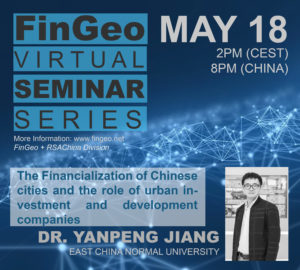Register for free here (Regional Studies Association)

The financialisation of Chinese cities and the role of urban investment and development companies
Shanghai, like other large Chinese cities, has multiple business districts. This paper examines the construction of one of its largest, at Hongqiao in the west of the city. Hongqiao is one of China’s biggest urban projects, rivalling some of the new CBDs in Guangzhou and Beijing in terms of service sector development.Its specific focus lies in the central role played by one state-owned company, Shenhong, in the financing and construction firstly of the Hongqiao transport hub and then of the business district that makes up this new development pole.
A common feature of this type of mega urban project is the establishment by government of what are commonly called Urban Investment and Development Companies (UIDC) to operate the projects on behalf of government.
The paper examines in detail Shenhong as an organization as well as the tasks it has undertaken and the funding difficulties it has confronted. The paper has three aims. The first is simply to present a detailed account of the makeup of an IUDC and its relationship with its partner organizations. The second is to provide an insight into the struggle that one IUDC has faced in finding the funding to undertake the projects it was entrusted with in the face of stop-go policies on credit from central government. The third and preeminent aim is to set the IUDC within a wider theoretical framework, arguing that Shenhong and the many other similar companies that are orchestrating the high-rise urbanization of China should be seen as a manifestation of state corporatist urbanism, a latter-day version of the local-state corporatism that Jean Oi identified in the 1990s. It argues that Shenhong is representative of the seldom discussed state-owned Urban Investment and Development Companies that have led the urbanization of China. Shenhong was the arm of the Shanghai Municipal Government in the construction of the Hongqiao project. It was financed by state banks; it sub-contracted its ‘dirty work’ of demolition to other state entities and of compensation and relocation to local government; it handed over management to an administrative authority of the state; this organization in turn called on the help of state-owned firms to make the initial real estate and development investments. Finally, in referring to this as state corporatist urbanism, we are adapting the conventional definition of corporatism. That is, rather than seeing corporatism as the co-optation by the state of non-state organizations for its own ends, we are describing a sort of inside-out corporatism in which the state adopts some of the trappings of the corporate sector in order to engineer urban growth. This is corporatism which, in line with Oi’s reading, uses state formations to undertake on behalf of the city government the entrepreneurial activities that would otherwise be largely entrusted to the private sector.
Yanpeng Jiang is currently based at East China Normal University as research professor. He received his PhD in Geography from the University of Leeds. Before joining the Department of Geography at the University of Hong Kong as a research fellow, he worked as a fellow in the College of Asia and the Pacific, Australian National University. His main research interests are urbanization, financialization of mega urban projects and social change and governance in contemporary China as well as comparative urban studies, development of global cities and inter-city competition, regional industrial transformation and upgrading in the Asia-Pacific region. He published a series of papers in top journals of International Journal of Urban and Regional Research, Environment Planning A, Environment Planning C, Urban Studies, Journal of Peasant Studies etc.
JIANG Yanpeng, Research Professor, School of Urban and Regional Studies, East China Normal University
Email: yanp.jiang@gmail.com
